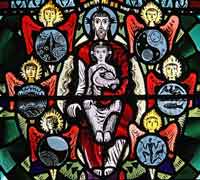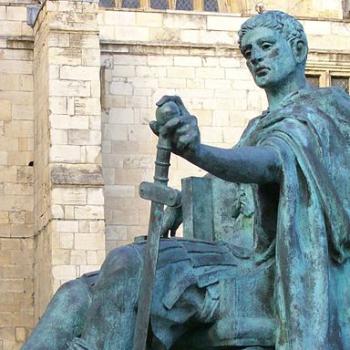By Tammy Wiens
 Tammy Wiens, editor of the Hungryhearts Journal, interviews three theologians about the Trinitarian view of God. Charles Wiley is an Associate for Theology in the Office of Theology and Worship for the National Offices of the PC(USA) and served as staff to the Working Group that drafted "The Trinity: God's Love Overflowing," a report presented to the 217th General Assembly (2006). Michael Walker is Theologian in Residence at Highland Park Presbyterian Church in Dallas, Texas. Christine Chakoian is Pastor/Head of Staff of First Presbyterian Church, Lake Forest, Illinois. What follows are some of the highlights of that conversation.
Tammy Wiens, editor of the Hungryhearts Journal, interviews three theologians about the Trinitarian view of God. Charles Wiley is an Associate for Theology in the Office of Theology and Worship for the National Offices of the PC(USA) and served as staff to the Working Group that drafted "The Trinity: God's Love Overflowing," a report presented to the 217th General Assembly (2006). Michael Walker is Theologian in Residence at Highland Park Presbyterian Church in Dallas, Texas. Christine Chakoian is Pastor/Head of Staff of First Presbyterian Church, Lake Forest, Illinois. What follows are some of the highlights of that conversation.
What does it mean to say that "Trinity" expresses the nature of who God is?
Christine: When we say that Trinity expresses the nature of who God is, first we're saying in part that God can't be contained in one image or person but that God has chosen to be revealed in a triune way. But we're also saying that we know something specific about who God is: these particular three persons of the Trinity are who God is.
Michael: What I think of first is "relationship." God is not a static unipersonal being but one who exists in an eternal love relationship between Father, Son, and Holy Spirit. And, so in a very real way, the foundation of all of reality is in unbreakable relationships of love.
Thinking about the nature of God in terms of relationship is very comforting, but isn't there also something unknowable about God?
Michael: It is a great mystery; it is beyond what we could fully comprehend, but it invokes in us something deep and wonderful that we want to be a part of. On the other hand, Trinity isn't something human beings thought up. This is who God has revealed himself to be. It's not people's imagination that conjured up the notion of a Trinity. It is God who comes to us as the Father who raised Jesus, the Son, in the power of the Spirit. This is who God is. It is a great mystery but at the same time, the ministry of the three persons of the Trinity is revealed to us in Holy Scripture and beckons us to worship the Triune God of Grace.
Integrating this into our liturgy has to be more intentional if we think it's important for people to be in tune with the Trinity. How can we do that?
Michael: The very order of worship itself can be helpfully Trinitarian. For instance, I have put some explanations in the bulletin for people to read so that they can understand what's going on. The liturgy begins with God, our Father, calling us to worship and then immediately this leads into a prayer of confession and a need to be forgiven through [Jesus Christ], and then we receive the Ministry of the Holy Spirit through the Word and our response to the Word...
The other thing that comes to mind concerns the Celebration of the Sacraments. I like to take time to explain why we baptize in the name of the Father and the Son and the Holy Spirit. Or, to explain why the Eucharistic liturgy includes references to the Father, the Son, and the Holy Spirit. I let the congregation know that by the Spirit, Jesus is lifting us up into the Triune life of God so that we can commune with our Father.
Christine: I think a piece of it is not just in any individual worship service, but over the course of the church year lifting up the various aspects of the Trinity.
If there were just one message we could get across about Trinity to people in our congregations, what would it be?
Charles: I think for many folks when they hear the word Trinity, they think "hard to understand" or "irrelevant." I hope that when folks encounter the Trinity more deeply that the word association for Trinity will change to "gospel," "gift," "invitation" -- those kinds of words. That they will see this as the character of the God who is for us...That there will be gospel words associated with Trinity as opposed to more abstract words or more conceptual terms.
Michael: What I would love for believers to take away from an experience of Trinitarian worship is the conviction that the God of Grace is a Divine Team who is intimately involved with his creatures, working for our salvation, and inviting us to love and worship him.
Christine: The other thing I would add is that I want to equip people with language to describe what they're experiencing when they are experiencing the presence of God. Especially in our time, when there are so many other perceptions and answers and people making it up as they go along, I think it is so helpful to explain what it is they're experiencing and to ground this in our scriptural and historical understanding of who God is and what God is about and how God is manifested. It's comforting in many ways for people to know this... that their experience [with God] is the same God of Abraham, Isaac, and Jacob; it is the same God that the early Church knew; it's the same God who was present then and the same God who is across time and space. It's comforting, it's grounding, and it's equipping.



